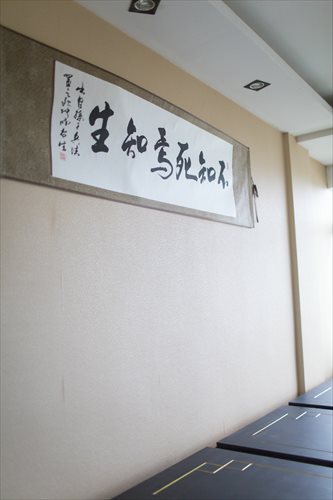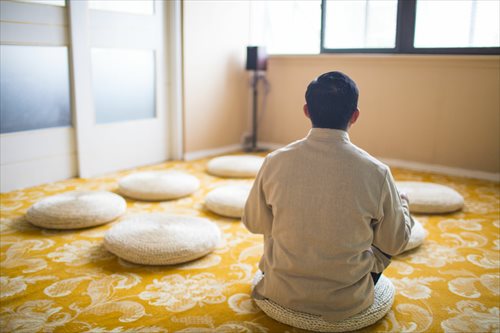Near-death experience
Macabre new practice helps participants realize what’s important in life
Last Saturday, Jia Ying (pseudonym), a 27 year-old Shanghai native, experienced a fake funeral of her own in a small room in Top M50 creative park in Putuo district.
At about 2 pm, Jia was asked to put on a white shroud. She was then taken to a dim room and asked to sit cross-legged on a mat at a narrow table. There, she watched several videos projected on a screen in front of her, which talked about the insignificance of many of the things we hold dear in our lives, with narration provided by a stern-sounding man.

Jia was then led to another room, which contained a line of black coffins. A scroll on the wall read "If you don't know death, how will you know life?" (pictured above) Jia stepped into one of the coffins and sat down. The room was permeated with a sad melody. Jia was given 15 minutes to write down her "last words" on a piece of paper.
Then, she lay on her back in the coffin, her face covered by a piece of thin, white cloth. The coffin was closed. After five minutes in darkness and silence, the lid was opened and Jia experienced a "rebirth."
All of this took place at Lingxin Culture and Communication Company (3/F, Bldg 1, 18 Wuwei Road East, 6111-2894). The company claims to be the first on the Chinese mainland to offer such a "death experience" to the public. It began trialling the experiences in April, and so far more than 100 people have taken part.
Self-examination
"There is a saying that if one's self-examination could take place 50 years ahead of schedule, half the world's population would become great people," said Xie Hongquan, manager and co-founder of Lingxin. The idea to create such a service came to him in 2010 after watching the Chinese movie If You Are The One 2, in which a dying man organizes a farewell ceremony for himself and makes a pathetic self-examination of his life.
Xie told the Global Times that he was caught in confusion about life at that time, though he was affluent with a successful media company and a happy family. He consulted his psychotherapist friend, Tang Yulong, who had a practice in Shenyang, Liaoning Province. Tang introduced Xie to "death experience" therapy, which Xie has used ever since.
"Nowadays, people, especially those in middle age, are kept busy with endless concerns in life, such as making money or having a successful career, which seem to be our top priorities. But only when our lives are ending do some of us realize what the most important things are, and the regrets we have left in our hearts," said Xie. He said he began to take on a brand-new outlook on life after the therapy, and wanted to promote the method to more people. Lingxin, a brainchild of Xie and Tang, came into being.
Not alone
As a matter of fact, Tang is not alone in his use of "death experience" therapy. In South Korea, which has a particularly high suicide rate, companies send employees on "fake funeral" programs to help prevent suicide. In Taiwan, Jen-Teh Junior College of Medicine, Nursing and Management launched a "death experience" for students in the department of funeral sciences in 2010.
Another venue that offers "death experience" in Shanghai is to start its trial run in August, and officially open in October, according to one of its co-founders, Huang Weiping, who has been working at an NGO that offers hospice care since 2009.
The new venue is named Xinglai (meaning wake up in Chinese), and will offer a more comprehensive experience for visitors through simulating various environments, such as the interior of an incinerator and a uterus, by using multimedia facilities.
Zhang Zhenyu, who holds a PhD in applied psychology and a member of the Shanghai Psychological Society, told the Global Times that it has been a common practice in psychotherapy to let patients write "last words" or an "epitaph" of their own to help them know themselves better and find a sense of happiness. During the process, psychotherapists play a significant role in leading patients to find solutions to their problems.
"The appliance of tools such as coffins is a creative trial that can provide a more vivid environment that helps people contemplate mortality," Zhang said.

Participants are encouraged to contemplate their mortality by enacting a death ceremony. Photos: Courtesy of Lingxin Culture and Communication
But Zhang also revealed his own concerns toward the commercial practices surrounding such therapy.
"In the office of a psychotherapist, the patient's interest is the core concern during the whole process. But I'm not sure whether a company, for which profit remains its main goal, will pay enough attention to the psychological well-being of their clients."
Group experience
Besides the lying-in-a-coffin experience, Lingxin now also includes a consultation of about five hours in its "death experience" package, which usually serves four to five clients each time and lasts from 9:30 am to 5 pm. During the consulting process, participants will talk with experienced counselors, both in group and privately.
"For us, the 'death experience' is just the beginning," said Xie. "We would like to offer counseling services to participants in the long run," said Xie.
The price of a "death experience" package at Lingxin is 24,800 yuan ($4,026) per person. But so far, visitors to Lingxin have mostly been people who applied for a free trial during an online promotion held in May.
Recently, the company launched another promotion, in which the first person to sign up for a package pays 10 yuan, the second person 20 yuan, and so on. Currently, the package price is above 200 yuan.
The package offered at Xinglai lasts for 2.5 hours and also involves professional counseling. It costs 249 yuan per person.
As psychological counseling only started being used in China around a decade ago, regulations governing the sector are still loose, Zhang said, with no rules concerning the pricing of psychological services.